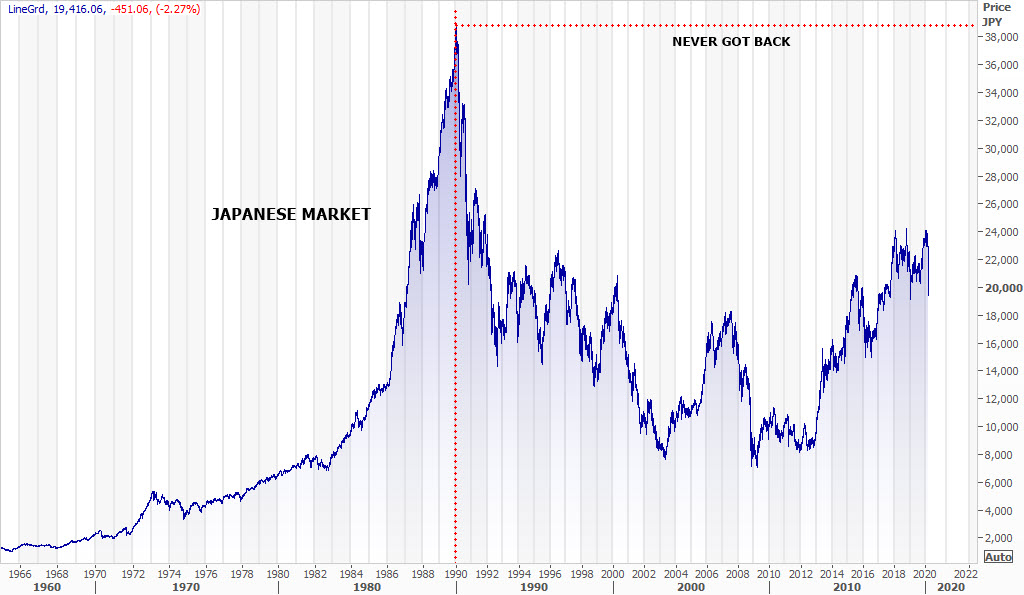With AMP Limited (ASX: AMP), NAB (ASX: NAB), Commonwealth Bank (ASX: CBA), Westpac (ASX: WBC) and ANZ (ASX: ANZ) shares falling over with the ASX 200 (ASX: XJO), Marcus Padley distills his years of investment market experience into this easy-to-follow guide.
A few years ago, I wrote a bear market survival guide and the information contained in it still seems to be as relevant today as it was then.
Interest in the stock market (any market) gets progressively eroded if it doesn’t trend up. An uptrend is needed to retain its appeal and without it, the market becomes a lot less easy/popular/active.
The longer a downtrend goes, the more interest wanes. As interest wanes the core function of the stock market — to raise capital — goes, as does the ambition of management and the opportunities for growth. A bear market breeds a bear market.
Here are a few rules on what to do in a bear market
Stop listening to platitudes. It is the curse of brokers if clients lose interest. It is the curse of fund managers if clients don’t make money. You can see why the whole financial industry is geared to optimism. Unless clients make easy money they bugger-off and the commissions and management fees bugger off with them.
Those well-known media star economists and strategists that work for AMP, NAB, Commonwealth Bank, Westpac and ANZ are salesmen for the biggest product selling institutions in Australia. Their job is to spread optimism and project certainty, so you don’t sell out (it was hard enough to get you in). So take their calming banalities with a pinch of salt.
Wake up! Sleep through this market volatility and you deserve to spend 10 years trying to get your money back. It took nine years (wasted) to recover the 1987 crash and we are 11 years after the GFC and we are yet to regain that high. Time is money. You do not waste money putting your head in the sand, you waste time. We can’t wait for purist ideas about value being reflected in the share price if it’s going to take 20 years. Sorry but HMS PATIENCE sank in 1987 and HMS BUY AND HOLD sank in 2007. You have to be on your toes in this game not quoting Benjamin Graham’s book written in 1954.
Don’t take anything for granted. Just ask a Japanese retail investor what they think about the long term. Their equity market fell 80% in 20 years after 1989.

In a bear market cash is king. Sorry, you can get very clever about which sectors you should be in, or which asset classes to buy, buying gold is the classic rubbish you will hear. Rotating into defensive stocks is another routine, but you will just lose money less quickly. In the end the easiest way to stop losing money is by going to cash. Hit the Port. Not selling is the biggest weakness of private investors (Caveat – I’ll leave you to worry about the tax position).
If you are a big super fund member, maybe go to your fund’s website, log in, find that page that allows you to choose between Cash, Conservative, Balanced and Aggressive and click “Cash”. Then you can wake up and enjoy the carnage rather than fear it. You only need to do it for a while. Far better you spend your time wondering when to buy than lie in bed taking losses and sweating on your foolishness.
Beware adviser optimism. Motherhood statements about it being alright, in the end, are of no value. They are the domain of the lazy adviser that doesn’t want you to do anything, that doesn’t want you to disappear and sell your products. If they can just persuade you to do nothing, they don’t have to do anything. Perfect. You wear all the risk after all. The bottom line is that the constant optimism (denial) of a bear market is the classic industry response. Now is the time to get on the phone and ask “Do you think I should sell anything?”. See what the response is. If they are half decent they will admit that they don’t know what’s going to happen next and ask you if you would like to sell something.
For the direct investor, the time has come to trade rather than invest. For those who are engaged be more trader than an investor. Gains are hard to come by in a bear market. Best you get sensitive to trends and shorten your time frame. If you can’t do that, sit in cash and do nothing until the siren for the end of the war goes off.
Be stock specific. In a bear market the focus goes to specific stock trades not “investing in the market” (which is going down). When gains are not universal you have to focus on particular stocks and stories. There is always something going up, the money will rally to it. Find those stocks, there won’t be many but they will be popular.
Control losses. Traders should know how to do that. If you are a direct investor just run through every stock and every chart and set an appropriate stop loss. Any trigger to stop you staying “in denial”. It is a time for the buy and hold investors to break the habits of a lifetime and at least consider using basic stop losses as a loss control mechanism (anything to get you to sell something).
Ignore the “Buy, it’s cheap” calls from value investors. In a high-risk bear market, you have to do a little bit better than just buy good companies and wait for the value to appear. In a bull market you can hide. In a bull market even bad ideas don’t hurt. In a bull market, the game is about catching the best ideas. In a bear market you need your eyes on the market not the stocks. When the market stops falling you can go back to value analysis. By all means, collect a list of the stocks the value investors like on the way down but don’t buy them until they start going up. In a bear market, “Good” companies go down in price as well and fundamental information will be ignored, sometimes for years. Sentiment takes hold sometimes. Notably in the GFC the banks fell 56% whilst the intrinsic valuations probably fell 5 or 10%. Share prices are a combination of value and sentiment, not value alone.
Take profits more often…because they won’t last.
When it’s over, what do I do?
When do you buy back in? Keep reading and paying attention. Timing that low is our current and most important purpose.
What do I buy when the time comes? Keep reading and paying attention. We will be listing stocks to buy.
I’m Marcus Padley, the author of the Marcus Today stock market newsletter. To sign up for our free 14-day trial and access our ASX share research and commentary, please click here. There’s no obligation and no credit card required. Just come in and take a look.











